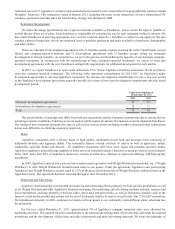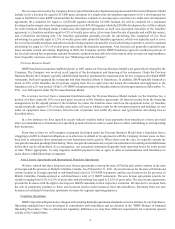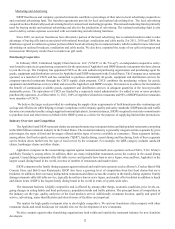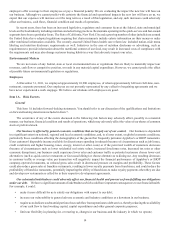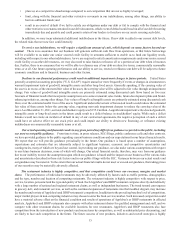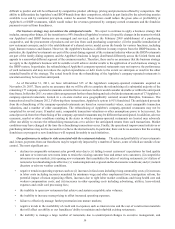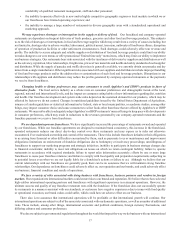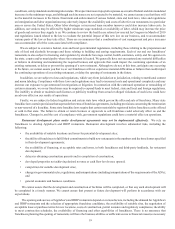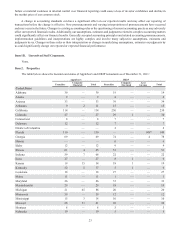IHOP 2011 Annual Report Download - page 35
Download and view the complete annual report
Please find page 35 of the 2011 IHOP annual report below. You can navigate through the pages in the report by either clicking on the pages listed below, or by using the keyword search tool below to find specific information within the annual report.17
availability of qualified restaurant management, staff and other personnel;
• the inability to operate effectively in new and/or highly competitive geographic regions or local markets in which we or
our franchisees have limited operating experience; and
• the inability to manage a large number of restaurants in diverse geographic areas with a standardized operational and
marketing approach.
We may experience shortages or interruptions in the supply or delivery of food. Our franchised and company-operated
restaurants are dependent on frequent deliveries of fresh produce, groceries and other food and beverage products. This subjects
us to the risk of shortages or interruptions in food and beverage supplies which may result from a variety of causes including, but
not limited to, shortages due to adverse weather, labor unrest, political unrest, terrorism, outbreaks of food-borne illness, disruption
of operation of production facilities or other unforeseen circumstances. Such shortages could adversely affect our revenue and
profits. The inability to secure adequate and reliable supplies or distribution of food and beverage products could limit our ability
to make changes to our core menus or offer promotional "limited time only" menu items, which may limit our ability to implement
our business strategies. Our restaurants bear risks associated with the timeliness of deliveries by suppliers and distributors as well
as the solvency, reputation, labor relationships, freight rates, prices of raw materials and health and safety standards of each supplier
and distributor. While the supply of pancake and waffle dry mixes is generally available, we currently obtain our pancake and dry
mixes from a single manufacturer. Other significant risks associated with our suppliers and distributors include improper handling
of food and beverage products and/or the adulteration or contamination of such food and beverage products. Disruptions in our
relationships with suppliers and distributors may reduce the profits generated by company-operated restaurants or the payments
we receive from franchisees.
Changing health or dietary preferences may cause consumers to avoid Applebee's and IHOP's products in favor of
alternative foods. The food service industry as a whole rests on consumer preferences and demographic trends at the local,
regional, national and international levels, and the impact on consumer eating habits of new information regarding diet, nutrition
and health. Our franchise development and system-wide sales depend on the sustained demand for our products, which may be
affected by factors we do not control. Changes in nutritional guidelines issued by the United States Department of Agriculture,
issuance of similar guidelines or statistical information by federal, state or local municipalities, or academic studies, among other
things, may impact consumer choice and cause consumers to select foods other than those that are offered by Applebee's or IHOP
restaurants. We may not be able to adequately adapt Applebee's or IHOP restaurants' menu offerings to keep pace with developments
in consumer preferences, which may result in reductions to the revenues generated by our company-operated restaurants and the
franchise payments we receive from franchisees.
We are dependent upon our franchisees. We have significantly increased the percentage of restaurants owned and operated
by our franchisees. While our franchise agreements are designed to maintain brand consistency, this increase in the franchised-
operated restaurants reduces our direct day-to-day control over these restaurants and may expose us to risks not otherwise
encountered if we maintained ownership and control of the restaurants. These risks include franchisee defaults in their obligations
to us arising from financial or other difficulties encountered by them, such as payments to us or maintenance and improvement
obligations; limitations on enforcement of franchise obligations due to bankruptcy or insolvency proceedings; unwillingness of
franchisees to support our marketing programs and strategic initiatives; inability to participate in business strategy changes due
to financial constraints; inability to meet rent obligations on leases on which we retain contingent liability; failure to operate
restaurants in accordance with required standards; failure to report sales information accurately; efforts by one or more large
franchisees to cause poor franchise relations; and failure to comply with food quality and preparation requirements subjecting us
to potential losses even when we are not legally liable for a franchisee's actions or failure to act. Although we believe that our
current relationships with our franchisees are generally good, there can be no assurance that we will maintain strong franchise
relationships. Our dependence on franchisees could adversely affect us, our reputation and our brands, and could adversely affect
our business, financial condition and results of operations.
We face a variety of risks associated with doing business with franchisees, business partners and vendors in foreign
markets. Our expansion into international markets could create risks to our brands and reputation. We believe that we have selected
high-caliber international operating partners and franchisees with significant experience in restaurant operations. However, the
ultimate success and quality of any franchise restaurant rests with the franchisee. If the franchisee does not successfully operate
its restaurants in a manner consistent with our standards, or customers have negative experiences due to issues with food quality
or operational execution, our brand values could suffer, which could have an adverse effect on our business.
There also is no assurance that international operations will be profitable or that international growth will continue. Our
international operations are subject to all of the same risks associated with our domestic operations, as well as a number of additional
risks. These include, among other things, international economic and political conditions, foreign currency fluctuations, and
differing cultures and consumer preferences.
We also are subject to governmental regulations throughout the world that impact the way we do business with our international


